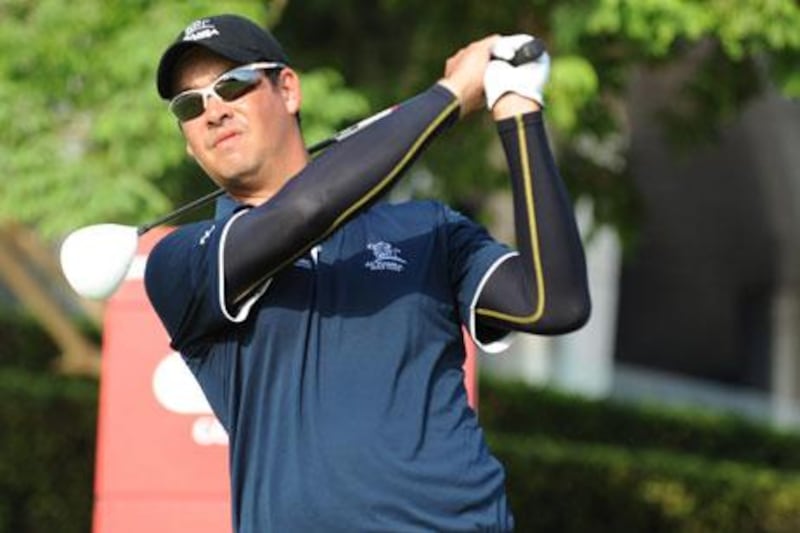Wira Salleh made sure the scorecard was marked correctly after his final round at the Al Ain Equestrian, Shooting and Golf Club on Wednesday and then sat down to work out how much money he had made from the first Mena Tour. It did not take the Brunei professional long.
"I am out of pocket by about US$5,000 (Dh18,365), I would guess," Salleh said. "I came out here on my own money. Nobody is helping me.
"I would say that would be the same for the majority of the guys. I was never really going to cover my costs, unless I won. So it's more about pride than anything, and me trying to do well against some really good players. But in saying all that, I will be back next year."
Salleh's response is typical of the players who performed on four of the UAE's best golf courses over the past month. The hole in their pockets, it seems, has not dulled their enthusiasm for the Tour or the sport.
Charan Thethy has spent $4,000 to pound the fairways of the courses at Saadiyat Beach, Tower Links, Al Badia and Al Ain, and acknowledges that he is "not even close" to recouping that amount.
"I missed the last cut by one shot, and that means I have made around about $1,500, so I have lost quite a bit," the 37-year-old Kenyan said.
Thethy would like to see the $50,000 prize money for each tournament spread out more evenly. The winner of each event received $9,000, the runner-up between $5,000 and $6,000, and third place around $3,000. The player bringing up the field after making the cut has taken home $284 to $341.
"If the money went up, which I presume it will, then I'd like to see the distribution improve," Thethy said. "For example, someone like myself could make my money back simply by making the cut. That would be more sensible, especially if they take it to other countries and that looks a certainty.
"That would get guys to come back again and again and at least you would get the chance to break even. I'm afraid I don't get paid big sums of money just to turn up, like the top guys."
The Mena organisers have said that next year's Tour could include stops in Morocco, Tunisia, Egypt and Bahrain. Broadening the Tour will give it a true regional flavour, but it will also add further expense for those who do not have their hotels, flights and food costs covered by sponsors.
"The Tour going to other countries might make things tricky," said Simon Dunn, the Englishman who finished sixth at the Sheikh Maktoum Open. "The more countries you go to, the more expensive it gets.
"The fact all four events were in the UAE this time meant there is only one air fare involved, only one hotel and the rent of one car."
Dunn said he would be "writing off" $3,000 even before he teed off if the organisers staged a single event in Africa.
"Let's put it this way: I'm not going to fly to Morocco for a single $50,000 event or Egypt for the same," Dunn said. "So unless there are three events in a row in Morocco, then a few might think my way. To play just one event in a country and then move on, from a financial standpoint, doesn't make any sense. To localise the events would help the players."
Salleh concurred. "They are talking about taking the Tour to different countries next year and we would have to see whether I could stretch to that," he said. "I would love to go and play golf anywhere, but so much is dependent on the finances."
Adrian Flaherty, the Tour commissioner, acknowledged the monetary concerns of Dunn and his fellow players. But he feels that the current prize fund and the carrot of automatic qualification for the Dubai Desert Classic provides sufficient incentive.
"Simon is entitled to his view. However, having spoken to a lot of the other guys, I would suggest many of them would travel for one $50,000 tournament," Flaherty said.
"In fact, when you consider what we offer at the end of the Tour, regarding qualification to the Dubai Desert Classic and perhaps other big events, then I'm confident lots of players would travel to Saudi Arabia, Morocco or wherever. We would like, however, to stage more than one event in a host country at a time."
Shafiq Masih, the Pakistani, made a small profit of a few thousand dirhams and will return next year. He hopes the successful first staging of the event could attract more sponsors.
"There were a lot of good things on this first Tour and I believe this is the start of something great," Masih said. "I am sure there will be more sponsors and that means more money. That would help players move from country to country, because there would be more money going about."
Dunn acknowledged that players will always gravitate to the Tour despite the cost.
"No matter where you stage a golf tournament, if it is well organised, such as this tour most definitely has been, then people will want to play in it whatever it costs them," Dunn said. "That's what makes us professional golfers."
Salleh should be among the first to pay the $750 fee for the Mena Tour professional membership next year. "Why do I do it? Well, it's a chance to make a move up," he said. "And why would you pass up that opportunity?"
Follow us
[ @SprtNationalUAE ]





